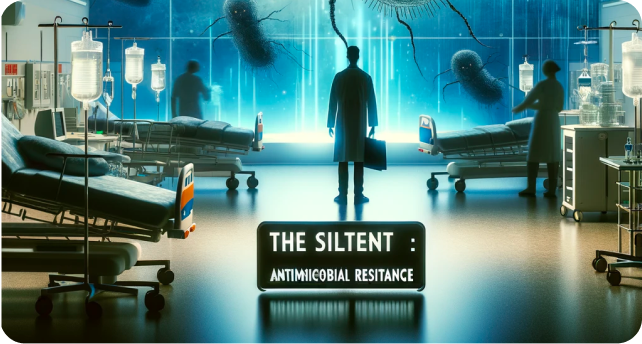

Antimicrobial resistance (AMR) develops when microorganisms (such as bacteria, fungi, viruses,and parasites) change or adapt to antimicrobial drugs (such as antibiotics, antifungals, antivirals, and antiparasitics), resulting in unsuccessful treatment (2). Antimicrobial resistance has emerged as one of the serious threats to human health in the 21st century (3). One of thereasons for the AMR is the irrational use of antibiotics by people, animals, and plants along withlack of proper hygiene and sanitation measures in healthcare settings, prescription ofantimicrobial drugs, incomplete adherence to treatment courses by patients, insufficientresearch and development of new generation antimicrobial agents (4).
Combatting Hospital-Acquired Infections in the Era of Growing Antimicrobial Resistance"
A recent study predicts that approximately 471 million people will be affected by AMR in the near future (5). Without timely action, AMR could cause a staggering 10 million deaths annually by 2050, surpassing HIV/AIDS and malaria as the leading cause of death. Moreover, the economic burden is projected to exceed 100 trillion dollars in healthcare expenses. Urgent measures are needed to combat this global health crisis (6).
In India 1,042,500 deaths associated with AMR and 297,000 deaths attributable to AMR in 2019.More people die from antimicrobial resistance (AMR) in India than from neoplasms,tuberculosis, lung infections, enteric infections, diabetes, kidney diseases, and disordersaffecting mothers and newborns indicating AMR as a serious threat (7).
Hospital Acquired Antimicrobial resistance-related infections cause a serious problem for the healthcare setting. Antibiotic-resistant bacteria are increasingly causing hospital acquired infections (HAI), leading to higher rates of morbidity and mortality. The spread of resistant microorganisms by healthcare workers within hospitals is one of the causes of this rise in antibiotic resistance. Hospitals and healthcare facilities are the primary breeding grounds for superbugs due to factors such as over-prescription of antimicrobial drugs, inadequate infection control, and close proximity of patients with different infections.
Hospitalized patients face a challenging threat from Acinetobacter, a Carbapenem-resistantagent that often contaminates hospital surfaces and shared medical equipment. Pneumonia,bloodstream, wound, and urinary tract infections are caused by carbapenem-resistantAcinetobacter. Patients in intensive care units are typically the ones who get these infections.

"We need to stop referring to a coming post - Antibiotic Era - It's already here. You and I are living in a time when some miracle drugs no longer perform miracles and families are being ripped apart by a microscopic enemy."




